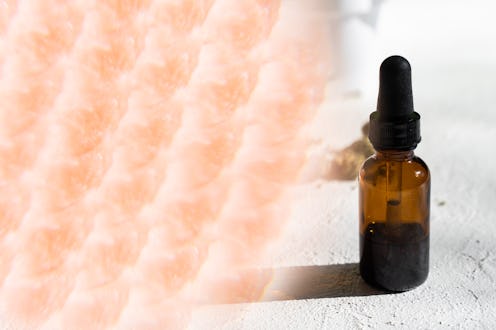News
How CBD Took Over Celebrities' Shelves & Your Instagram Feed

Lattes, chocolates, tampons, bath bombs: You can find CBD in everything these days. Depending on who you ask, it’s either a cure-all elixir or a phony “wellness” trend that’s overhyped. The truth is probably somewhere in between. Given the popularity and swift rise of the CBD industry, it seems everyone from celebrities to skeptics has something to say about it. Factor in how murky CBD’s legal status is and the FDA’s recent pledge to regulate it, and it makes sense that we can’t stop talking about it. But how did we end up here?
CBD is short for cannabidiol, a non-psychoactive compound found in cannabis plants. You probably think about marijuana when you hear about cannabis, but a lot of the CBD sold by companies in the United States actually comes from hemp, not marijuana. Unlike marijuana, hemp contains extremely low levels of THC, a psychoactive compound — which is why hemp-derived CBD won’t get you high.
For a long time, this distinction didn’t matter to the federal government. The Drug Enforcement Administration (DEA) used to take the position that hemp was only legal if it was grown under super-specific conditions and used for research purposes. Yet, you could still buy it online. The agency said in 2017 that it was focused on the opioid crisis and didn’t intend to prosecute CBD buyers, so people who took CBD generally didn’t have to worry about any legal consequences.
Then in late 2018, President Donald Trump signed the farm bill, a bipartisan piece of legislation that legalized hemp at the federal level and made it easier for farmers to cultivate the crop. The law defined hemp as cannabis plants containing less than 0.3 percent THC, and it removed hemp from the DEA’s Schedule 1 classification, which the agency defines as “drugs with no currently accepted medical use and a high potential for abuse.”
Recently, Brightfield Group, a market research firm, said CBD will be a $22 billion industry by 2022. Even celebrities who either consume CBD products or have started their own brands are helping bring the compound to the public eye. Luxury brand Lord Jones, which sells products like CBD dark chocolate, gumdrops and body oil, counts Melissa McCarthy and Mandy Moore among its fans; Willie Nelson has his own CBD company, as does Whoopi Goldberg. Even Martha Stewart is starting her own line.
For the perpetually stressed-out consumer, CBD offers a more wellness-focused introduction to cannabis.
“There is a lot of opportunity for businesses to break into a new industry here,” David Wunderlich, who heads up the CBD practice at law firm McAllister Garfield, tells Bustle. “There’s no turning back at this point.”
CBD is often marketed as the ultimate self-care tool for serious relaxation. According to Gallup, nearly 80 percent of Americans say they’re stressed out. Scroll through the Instagram feeds of popular CBD companies like Fleur Marché, and you’ll see calming pastels and nature scenes, as opposed to the psychedelic colors and marijuana leaves so prominently featured in “stoner” culture. For the perpetually stressed-out consumer, CBD offers a more wellness-focused introduction to cannabis.
However, questions about CBD’s effectiveness and legality still remain. Unlike food and dietary supplements, no governmental body currently approves CBD products. The U.S. Food & Drug Administration has the authority to do so, though, and before former FDA chief Scott Gottlieb left the agency in early April, he announced the creation of a working group to explore next steps for potential regulations.
Dr. Alex Capano, PhD, a nurse practitioner with a doctoral degree in cannabinoid science who is also the chief science officer of Ananda Hemp, tells Bustle that she feels conflicted about how the government currently handles the compound. CBD is something that "can help people lead healthier, happier lives," Capano says, noting that there's very little risk involved with a quality CBD product. But, she adds, "on the other hand, it’s an unregulated industry and unfortunately there are some snake oil companies out there, meaning they could have harmful chemicals in them.”
Needless to say, CBD isn’t going anywhere. You’ll probably hear about it even more as the market for it continues to grow, and as the government figures out how to deal with the booming industry.
This article was originally published on